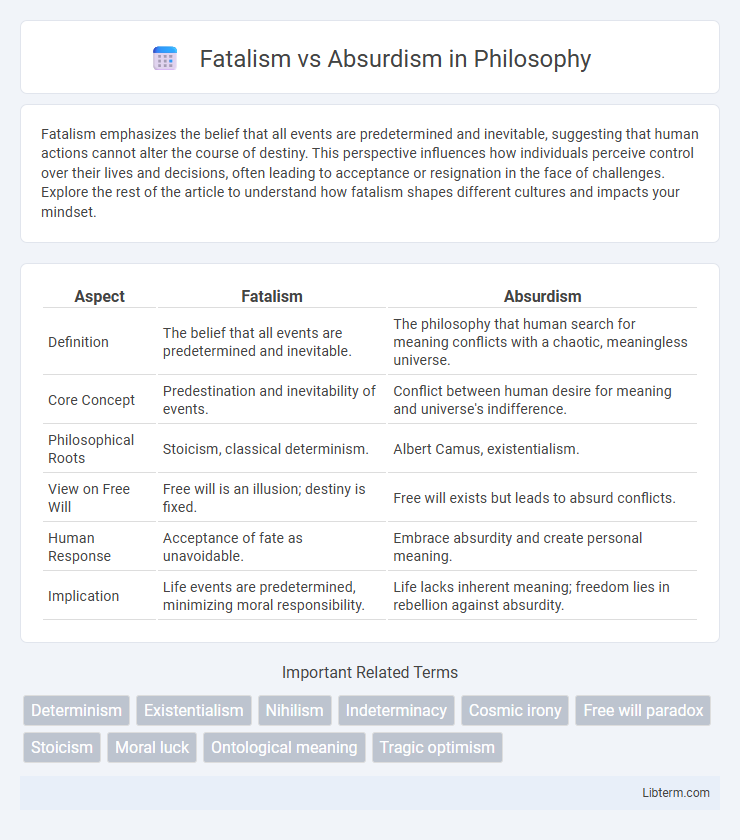Fatalism emphasizes the belief that all events are predetermined and inevitable, suggesting that human actions cannot alter the course of destiny. This perspective influences how individuals perceive control over their lives and decisions, often leading to acceptance or resignation in the face of challenges. Explore the rest of the article to understand how fatalism shapes different cultures and impacts your mindset.
Table of Comparison
| Aspect | Fatalism | Absurdism |
|---|---|---|
| Definition | The belief that all events are predetermined and inevitable. | The philosophy that human search for meaning conflicts with a chaotic, meaningless universe. |
| Core Concept | Predestination and inevitability of events. | Conflict between human desire for meaning and universe's indifference. |
| Philosophical Roots | Stoicism, classical determinism. | Albert Camus, existentialism. |
| View on Free Will | Free will is an illusion; destiny is fixed. | Free will exists but leads to absurd conflicts. |
| Human Response | Acceptance of fate as unavoidable. | Embrace absurdity and create personal meaning. |
| Implication | Life events are predetermined, minimizing moral responsibility. | Life lacks inherent meaning; freedom lies in rebellion against absurdity. |
Understanding Fatalism: Core Principles
Fatalism posits that all events and outcomes are predetermined and inevitable, rendering human effort powerless to alter destiny. This philosophy asserts that cause and effect govern every occurrence, leading to a fixed and unchangeable future. Core principles of fatalism emphasize acceptance of fate and the relinquishment of control over life's trajectory.
The Essence of Absurdism Explained
Absurdism centers on the conflict between humans' desire for meaning and the silent, indifferent universe, highlighting that life inherently lacks purpose despite our search for it. Unlike fatalism, which accepts predetermined outcomes as inevitable, absurdism encourages embracing the absurd condition without resignation or false hope. This philosophy, prominently explored by Albert Camus, asserts that acknowledging life's meaninglessness can lead to personal freedom and authentic existence.
Origins and Philosophical Roots
Fatalism traces its origins to ancient Greek philosophy, prominently featured in Stoicism, where the belief that all events are predetermined by fate governs human existence. Absurdism emerges from 20th-century existentialist thought, particularly through Albert Camus, emphasizing the conflict between human beings' search for meaning and the indifferent, chaotic universe. Both philosophies engage deeply with questions of fate, free will, and the nature of human existence, but fatalism accepts predetermined destiny, while absurdism highlights life's inherent meaninglessness and the human struggle to confront it.
Key Thinkers: From Determinists to Absurdists
Fatalism, explored by determinists like Baruch Spinoza and Pierre-Simon Laplace, asserts that all events are predetermined and inevitable, emphasizing causal necessity and the predictability of the universe. In contrast, absurdism, primarily developed by Albert Camus, highlights the inherent conflict between humans' search for meaning and the indifferent, chaotic nature of the universe, resulting in the "absurd condition." Key thinkers in fatalism often argue for acceptance and resignation, while absurdists advocate confrontation with the absurd through conscious rebellion and personal meaning-making despite life's inherent lack of ultimate purpose.
Life’s Meaning: Contrasting Fatalist and Absurdist Views
Fatalism asserts that life's meaning is predetermined and unchangeable, emphasizing acceptance of an inevitable destiny, while Absurdism highlights the conflict between humans' quest for meaning and the universe's inherent meaninglessness. Fatalists find purpose in surrendering to fate's design, whereas Absurdists embrace the absurd condition by creating their own subjective meaning. The divergence lies in fatalism's acceptance of external control versus absurdism's assertion of individual freedom despite existential uncertainty.
Free Will: Analyzing Agency in Both Philosophies
Fatalism asserts that all events and outcomes are predetermined, negating the possibility of genuine free will or autonomous agency. Absurdism acknowledges the inherent meaninglessness of the universe but emphasizes individual freedom to create personal meaning despite this absurdity, preserving a form of existential agency. Both philosophies explore human agency differently: fatalism restricts it through predetermined destiny, while absurdism empowers it through conscious rebellion against absurdity.
Coping with Existential Questions
Fatalism asserts that events are predetermined and inevitable, leading individuals to accept their fate as unchangeable, which can create a resigned form of coping with existential questions. Absurdism acknowledges the inherent meaninglessness of life but encourages embracing the absurd condition by creating personal meaning and continuing the search for purpose despite the lack of ultimate answers. Both philosophies address existential uncertainty but differ in coping strategies: fatalism promotes acceptance of destiny, while absurdism fosters active engagement with life's contradictions.
Everyday Implications: How Beliefs Shape Behavior
Fatalism, the belief that all events are predetermined and inevitable, often leads individuals to adopt passive behaviors, assuming their actions cannot alter outcomes. In contrast, Absurdism acknowledges the inherent meaninglessness of life but encourages persistent effort and personal rebellion against this void. These differing perspectives influence everyday decision-making, motivation, and resilience, shaping how people confront challenges and find purpose in routine existence.
Criticisms and Challenges of Fatalism and Absurdism
Fatalism faces criticism for undermining moral responsibility by suggesting that all events are predetermined, which challenges the basis of ethical accountability and free will. Absurdism encounters challenges in its assertion that life lacks inherent meaning, often criticized for potentially leading to nihilism or despair without providing constructive frameworks for personal purpose. Both philosophies struggle with practical applicability, as fatalism may foster passivity while absurdism requires individuals to confront existential ambiguity without definitive answers.
Finding Purpose: Navigating Between Fatalism and Absurdism
Fatalism asserts that all events are predetermined and inevitable, often leading to a passive acceptance of one's fate, while Absurdism embraces the conflict between the human desire for meaning and the universe's inherent meaninglessness. Navigating between Fatalism and Absurdism involves recognizing the limits of control while actively seeking personal purpose despite uncertainty. Embracing Absurdism encourages creating subjective meaning in a seemingly indifferent world, contrasting with Fatalism's acceptance of a fixed destiny.
Fatalism Infographic

 libterm.com
libterm.com